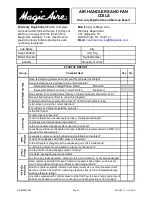
Venkon
Assembly, installation and operating instructions
50
10 Faults
The following chapter describes possible causes of faults and the work needed to rectify them. Should faults occur frequently,
shorten the maintenance intervals in line with the actual loading on the unit.
Contact the manufacturer with any faults that cannot be rectified using the following information
Behaviour in the event of faults
The following applies:
1. Immediately switch off the unit with faults that pose an immediate danger to persons or property!
2. Determine the cause of the fault!
3. Switch off the unit and prevent it from being reconnected if rectifying the fault requires work in the hazard area. Immedi-
ately advise a supervisor on site about the fault.
4. Either rectify the fault yourself or have it repaired by authorised personnel, depending on the nature of the fault.
, provides information on who is authorised to rectify and remedy
faults.
10.1 Fault table
Fault
Possible cause
Remedy
No function.
No power supply.
Check voltage, switch on repair switch.
Replace fuse.
Water outlet
Fault on the heat exchanger.
Replace the heat exchanger if you need to.
Hydraulic connection not properly done.
Check flow and return and tighten, if necessary.
Water outlet
Condensate drain outlets blocked.
Clean condensate outlets and check for ad-
equate gradient.
Chilled water line incorrectly insulated.
Check insulation.
Condensate drain not properly installed.
Check correct operation of condensate pump.
Check and clean condensate outlet.
Unit not heating or cooling sufficiently (LPHW/
CHW)
Fan is not switched on.
Switch on fan at controller.
Air volume is too low.
Set a higher speed.
Filter is dirty.
Replace filter.
No heating or cooling medium.
Switch on heating and/or cooling system, switch
on circulation pump, vent unit/system.
Valves not operating.
Replace faulty valves.
Water volume too low.
Check pump output, check hydraulics.
Setpoint temperature on the controller set too
low/high.
Adjust temperature setting on the controller.
Operating unit with integral sensor and/or ex-
ternal sensor is exposed to direct sunlight or po-
sitioned over a heat source.
Place operating unit with integral sensor and/or
external sensor in a suitable position.
Air cannot blow out or in freely.
Remove obstacles at the air outlet/air inlet.
Heat exchanger dirty.
Clean heat exchanger.
Air in the heat exchanger.
Vent heat exchanger.
Unit too loud
Speed too high.
Set a lower speed, if possible.
Air inlet/outlet opening is obstructed.
Free air ducts.
Filter dirty.
Replace filter.




































